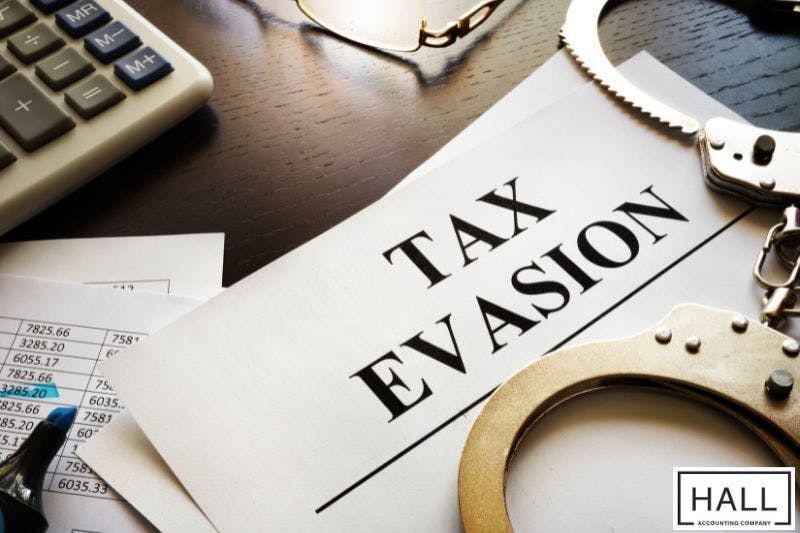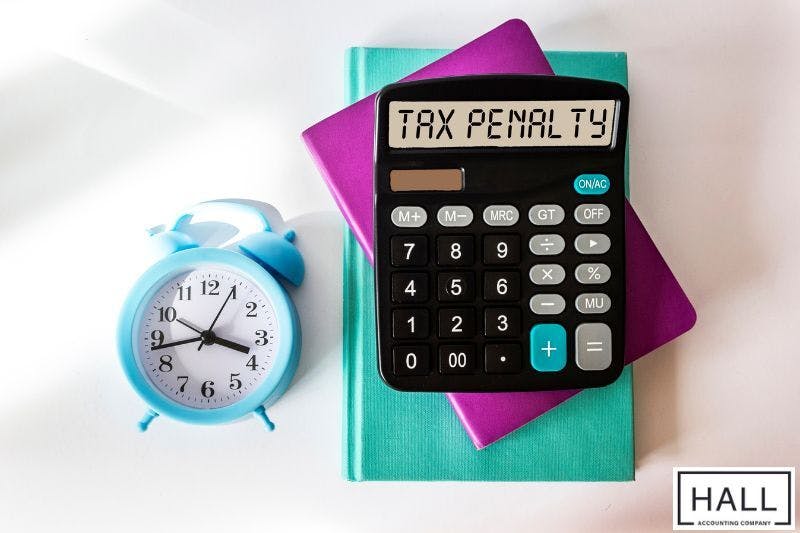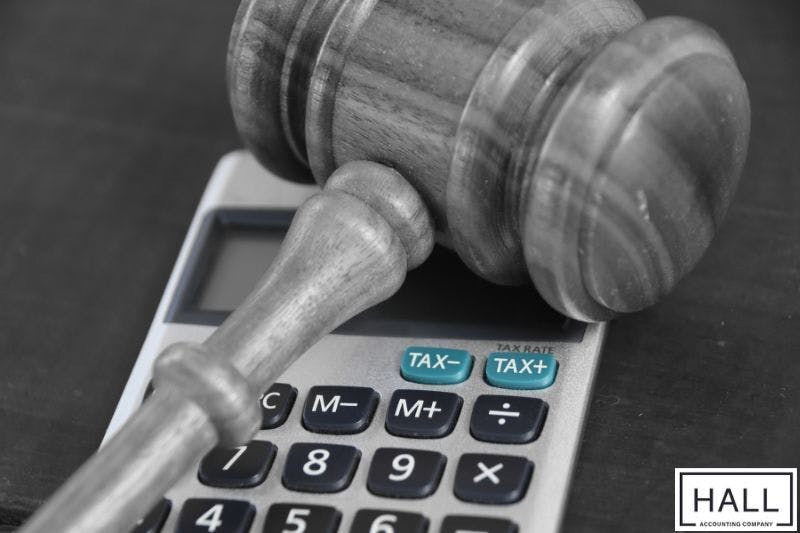
The law provides for significant penalties to be charged for filing a false tax return. The objective of the penalties is to deter taxpayers from being negligent, or willfully lying about their tax information. In addition to penalties, taxpayers can face jail time or substantial fines if they are found to have committed fraud.
We’re going to take a look at all the facts related to this topic so that whether you’re dealing with this now, or want to prevent something like this from happening again in the future, you will be armed with the facts.
Join us as we do a deep dive into the topic of false tax returns and what you can expect if the IRS has notified you that they believe you’ve provided incorrect or false information.
What qualifies as a false return?
A false return is a document submitted to the IRS that contains intentionally incorrect or false information. Tax crimes are heavily frowned upon and therefore can lead to severe civil and criminal penalties.
To understand the implications fully, we should distinguish between a false income tax return and one that has been incorrectly filed. The former one is a deliberate deception i.e. there has been intent to deceive for the purpose of tax evasion. The latter is due to an honest mistake or misunderstanding of tax laws. The honest mistake is often rectified by the IRS without any penalties.
Nature of false tax returns
The IRS deems a return as “false” when it meets the following criteria:
Deliberately underreporting income
Inflating allowable deductions, or claiming deductions that are not allowed
Claiming credits for which one is not eligible
Omitting taxable income all together
Putting assets in the name of another person to evade paying taxes on the assets, e.g. property tax
Federal tax crimes are dictated by Section 7201 of the U.S Internal Revenue Code. It must be understood that the key element for determining the guilt of a filer is the wilful intent of the filer to deceive the IRS. For example, if a taxpayer underreports their income by failing to declare earnings from a side business, knowing that doing so would reduce their tax liability, they are engaging in fraudulent activity.
How does the IRS distinguish between errors and fraud?

The IRS does understand that taxpayers often make mistakes, and they expect a certain number of these errors every filing season. When the IRS suspects a potential issue with a tax return they begin by sending a request for clarification. If the problem was due to a misunderstanding of tax law or how to complete the return, the mistake is unlikely to attract a penalty. The taxpayer will be given an opportunity to file a correction.
If the taxpayer is slow in providing information or the IRS gathers further evidence to suggest that the taxpayer knowingly submitted false or fraudulent statements, then it could turn into a full-blown investigation.
If you are asked to provide additional documentation or provide clarification on your tax return, the best thing to do is respond immediately. This will help your case tremendously. Ignoring requests, or refusing to submit documentation will be flagged.
The old adage goes: “Crime doesn’t pay” Submitting false statements certainly doesn’t pay and the IRS is unlikely to overlook anything false or suspicious, so you will be called to account.
The burden of proof falls on the IRS to show that there was wilful intention in submitting the fraudulent tax return. Defenses against willful tax evasion will often involve demonstrating that the taxpayer did not understand internal revenue laws correctly, had never submitted a false statement before, or took the advice of tax preparers who made a mistake.
A qualified tax attorney is needed to help you fight a federal tax crime, and avoid criminal prosecution. They know how the Internal Revenue Service works, and when something is considered a federal crime.
Penalties for filing false tax returns

There are a number of penalties imposed by the IRS for false or fraudulent returns, and they make up seven broad categories which we will discuss now. When it comes to penalties, it is beneficial to understand the specific IRS legislation that governs each situation. The U.S. Internal Revenue Code (IRC) contains several provisions that address tax fraud - among these 26 U.S. Code § 7206 - Fraud and False Statements is particularly significant.
Under 26 U.S. Code § 7206(1), it is a criminal offence to willfully make and subscribe any return, statement, or other document that is verified by a written declaration that it is made under the penalties of perjury, which the taxpayer does not believe to be true and correct as to every material matter.
In this section we examine penalties charged for specific offences as prescribed by the tax codes above.
1. Accuracy-related penalties
When the IRS determines that the taxpayer has understated their tax liability due to negligence, disregard for rules, or a substantial understatement of income, they will impose this penalty.
Negligence or disregard for rules: Penalty: 20% of the underpayment of tax.
Understatement of income: Penalty: 20% of the underpayment of tax.
2. Civil fraud penalty
This is a more severe penalty that the federal government allows the IRS to impose when it has been concluded that a taxpayer willfully attempted to evade taxes. Civil penalties are much higher than accuracy penalties because it is deemed a willful failure.
Penalty: 75% of the portion of the underpayment attributable to fraud.
3. Failure to file penalty
This penalty is imposed when a taxpayer fails to file tax returns by the appointed deadline, including any extensions they applied for.
Failure to file
Penalty: 5% of the unpaid tax per month, up to a maximum of 25% of the unpaid tax.
The penalty starts accruing on the day after the tax filing deadline. For instance, if a taxpayer owes $10,000 and files the return three months late, the penalty would be $1,500 (15% of $10,000). A failure to file can be for a number of reasons such as not knowing about deadlines, a tax preparer has not filed returns, the taxpayer being out of the country, or ill enough to not be able to meet obligations.
Fraudulent failure to file
Penalty: 15% of the unpaid tax per month, up to a maximum of 75% of the unpaid tax.
4. Failure to pay penalty
This is considered an escalation in the matter by the taxpayer which the IRS does not take kindly. When a penalty is imposed the taxpayer must comply with the payment deadline, regardless of whether they agree with the assessment, or whether they are appealing the decision.
Penalty: 0.5% of the unpaid taxes for each month the taxes remain unpaid, up to a maximum of 25% of the unpaid taxes.
Reduced penalty for installment agreement
Penalty: If the IRS approves a taxpayer’s request for an installment agreement, the penalty rate may be reduced to 0.25% per month during the installment plan.
Unfortunately, there is no getting out of penalties once they have been sanctioned, so even if you make payment agreements after you have filed a late return, you will still pay penalties. The better course of action is to file the return and then make payment arrangements with the IRS. Anything you do that is seen as taking the law into your own hands will fall under willful evasion.
5. Frivolous tax submissions penalty

This penalty is imposed when a taxpayer has made what the IRS deems to be a frivolous tax submission. An example of this is submitting a tax return with zeros in every field, or refusing to pay taxes based on political, social, or governmental protests.
Penalty: $5,000.
6. Criminal penalties
In addition to civil penalties the IRS can pursue criminal charges in cases of severe tax fraud. These penalties are charged following a criminal conviction.
Tax Evasion (26 U.S.C. § 7201)
Penalty: Up to 5 years in prison and/or a fine of up to $250,000 for individuals ($500,000 for corporations).
Filing a False Return (26 U.S.C. § 7206(1))
Penalty: Up to 3 years in prison and/or a fine of up to $250,000 for individuals ($500,000 for corporations).
7. Interest for unpaid taxes and penalties
In addition to penalties, the IRS charges interest on any unpaid taxes. These charges accrue from the due date of the tax return until the penalty is paid in full.
Penalty: The interest rate is the federal short-term rate plus 3%, compounded daily.
Case law that has set tax penalty precedents
There are many interesting case studies (landmark cases) that have set the legal precedents that have led the IRS to their penalty codes. They provide clear examples of how the courts view tax evasion, submission of false tax returns, and other tax transgressions. Let’s look at one such case.
Cheek v. United States (1991)

One of the most significant cases in this area is Cheek v. United States, 498 U.S. 192 (1991). This Supreme Court case addressed the issue of willfulness in tax evasion cases and clarified the standard the government must meet to prove criminal intent.
Background
John L. Cheek, a commercial airline pilot, was convicted of willfully failing to file federal income tax returns and of willfully filing false withholding forms. Cheek argued that he sincerely believed that he was not legally required to file tax returns or pay federal income taxes, based on his reading of the tax code and certain tax protester literature. He claimed that his beliefs, although incorrect, were sincerely held and that he therefore lacked the willfulness required for a criminal conviction.
Supreme Court Decision
The Supreme Court held that a defendant's good faith belief that they were not violating the law, even if that belief was unreasonable, could negate the element of willfulness required for a conviction. The Court ruled that the government must prove that the defendant knew their actions were illegal and deliberately chose to ignore or violate the law.
The Cheek decision is significant because it established that a taxpayer’s subjective belief about their tax obligations can be a defence against criminal charges if the belief negates willfulness. This case has been cited in numerous subsequent cases where defendants claimed a lack of intent to defraud the government.
Recent tax evasion squabbles
The case involving former President Donald J. Trump’s tax returns have been highly publicized. A Manhattan jury found the Trump Organization guilty on multiple criminal tax charges in 2022. Donald Trump was not formally charged in this case, however he was repeatedly mentioned during the trial by persecutors.
In January 2023, the Trump Organization was fined $1.6m in penalties for what was called a long-running tax fraud scheme. The lone person charged in the scheme was the company's former chief financial officer, Allen Weisselberg. Prosecutor Joshua Steinglass stated, “The sheer magnitude of the fraud calls for the maximum possible fine for falsifying business records and helping senior managers evade taxes as they defrauded the tax authorities. The crimes were deep, wide, and long, lasting for decades”. [1]
In 2023, pop star Shakira settled her criminal tax charges case brought by Spanish prosecutors. Spanish authorities alleged that she owed $13.9m for the time she was residing in Spain between 2012 and 2014. Complicating the matter was Shakira’s offshore tax dealings, and she was asked to stand trial in 2022 to answer tax fraud charges. The pop star maintained her innocence and refused to settle, but eight minutes into court proceedings she decided to settle to avoid the possibility of a prison sentence.
These two cases show that prosecutors mean business where tax evasion is concerned and that governments are prepared to go to extraordinary lengths to bring offenders to book. The main reason for this is to ensure the integrity of the tax system and to deter future offenders.
What should you do if you’ve been charged with tax fraud?

If you are signed up for professional accounting and taxation services such as those offered by Hall Accounting Company, you should contact your tax professional as soon as you become aware of any IRS requests for additional documentation or clarification. Most accounting firms that file their client’s tax returns will help them with any IRS audits. There could be a very reasonable explanation for the request.
Don’t have a reputable accounting company helping you with your tax return and IRS representation? Having knowledgeable tax professionals on your side can be a real relief when it comes to stringent tax laws and codes. Call us today to discuss our taxation services.
If the IRS query was just about an honest mistake or genuine misunderstanding of tax law, then you won’t have to do anything else. If a small penalty is levied against you, pay the penalty as soon as possible or make payment arrangements.
However, if the IRS investigates further and finds that you willfully submitted a tax return, with the intent of deceiving the IRS, then you will need legal advice.
Why legal counsel is necessary
Tax law is highly complex, and the nuances of what constitutes tax fraud, tax evasion, or the falsification of a tax return are often not clear to non-experts. A lawyer can explain the specific charges, the potential penalties, and the possible defenses.
A lawyer also ensures that the taxpayer’s rights are protected throughout the investigation and legal proceedings. They can help prevent self-incrimination and improper conduct by investigators. An experienced lawyer will negotiate with prosecutors to reduce charges, seek a plea deal, or get the charges dropped (if there are grounds for doing so).
Final Thoughts from Hall Accounting Company
Getting into a legal tangle with the IRS can be a real mess. It’s not something you’re likely to get out of quickly and it could cost you much more than you originally saved by submitting a false tax return.
Honest mistakes are expected by the IRS and they know how to spot these, usually, errors and misunderstandings due to complex tax laws do not attract heavy penalties but the same cannot be said for willful intent. That is the intent to deceive and gain benefit from that deceit, either by avoiding paying taxes or reducing your tax liability.
We know that tax legislation can be complicated - especially for small business owners and individuals who find themselves having to account for taxes that they do not understand well in the first place.
If you feel like you’re out of your depth with your tax submissions and have recently had a change to the type of tax you pay, or have opened a small business and don’t know what you’re legally allowed to deduct, then give us a call. We can help you avoid unpleasant issues. One way we do this is by proactive tax planning, which helps you to reduce your tax liability legally and without nasty consequences.
Schedule a free consultation with us and let us steer you onto the right path, keeping your record clean with the IRS and avoiding penalties for tax transgressions. Let’s talk soon.
FREE CONSULTATION
References